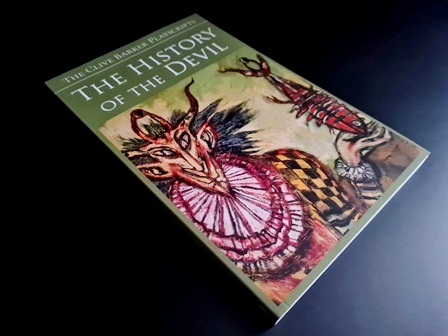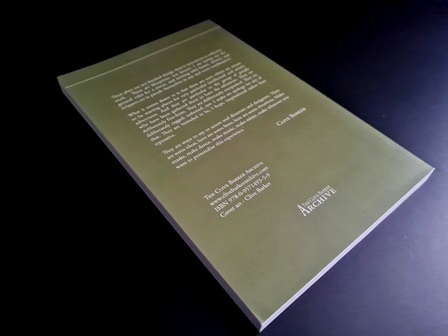
First published in this standalone format back in November of 2017, ‘The History Of The Devil’ formed the first of six books containing Barker’s playscripts that were published by Phil and Sarah Stokes through their project ‘The Clive Barker Archive’.
Written in 1980 by Barker for stage performance by The Dog Company, ‘The History Of The Devil’ is probably one of Barker’s best-known and most performed plays. It should be noted that although generally referred to simply as ‘The History Of The Devil’, the play does also boasts the longer title ‘The History Of The Devil, Or Scenes From A Pretended Life’.
The playscript was first published in print within the book ‘Pandemonium’ (1991), and then later reprinted within Barker’s playscript collection ‘Incarnations’ (1995).
Alongside the playscripts, this standalone presentation of the book contains additional material, including Author’s Notes, Cast and Credits, and an Afterword.
DLS Synopsis:
It was a morning like any other when lawyer, Samuel Kyle, is greeted at his London home by the Demon Verrier who’s come to take Samuel off to Africa to act as the Devil’s advocate.
Having no real choice in the matter, Kyle is whisked away by the demon, arriving in the sweltering heat of Kenya mere seconds later. It is here, in the dusty grime of this godforsaken land, beside the crocodile infested Lake Turkana, that Satan himself will stand trial in front of a pure and invisible jury. For the Devil is now up for parole, and by the terms of his exile, his appeal for returning to the City of God is to be judged by humankind.
If it’s found that his ministry tended more to evil than good, he’ll be condemned to Earth indefinitely. If, however, his advocate can prove his time on Earth hasn’t adversely affected mankind, he will be duly judged innocent and returned to Heaven.
And so, under the blazing heat of the unrelenting African sun, Judge Felix Popper presides over the court proceedings, assisted by his clerk of court Milo Milo. Acting as lawyers for the prosecution are the barristers Catharine Lamb and Jane Beck. It is here, with the tired and wearisome Devil, eager to have the trial over, the court will look back at key events from the past in which Lucifer has played a pivotal part in the course of history. And in the end, he will be judged for his actions and his eternal fate decided…
“History always begins with a cry”. It’s one hell of an opening line. So perfectly Barker that you know you’re in for a highly entertaining romp of a story. You’ll no doubt be pleased to hear that ‘The History Of The Devil’ certainly doesn’t disappoint.
Despite hosting a deeply ambitious idea for a dramatic play, where the devil himself is put on trial, the playscript was nevertheless written with the Dog Company’s financial limitations in mind.
That said, when reading the script, Barker doesn’t hold back in thrusting his audience through a massive timeline in order to paint a picture of the Devil’s supposed involvement with humanity over a period of some thirty centuries. Indeed, after having arrived in Africa, with the scene for the trial established and the court case having duly commenced, this looking back over Satan’s history forms the main body of the play.
Interspersed with comments and responses from the handful of participants in attendance at this open-air courtroom, we’re taken through scene after scene from the past, all of which are designed to paint a somewhat tragic picture of Satan.
With tongue in cheek, Barker mixes a thick helping of dry wit with elements of cruel tragedy, horror and the downright perverse. Many of these snippets from Satan’s supposed history are warped and reimagined, designed to provide the story with a comically human touch. It embraces history (or a preferred history), conjuring up imaginative revisions of the past to assert how the devil had a hand in so many of these principal events.
Barker’s humanising of Lucifer is an absolute key element to the play. In doing this, and achieving it so very devilishly well, Barker has produced a magnificently engaging and humorous parody on Christian stories – taking much enjoyment from the light-touch of a charmingly charismatic antagonist, who is shown as a far stretch from the exaggerated beast we have been led to believe he is.
To say this is an entertaining read would be an understatement. It’s as amusing as it is wildly imaginative. As with most plays, the story is almost entirely character and dialogue driven, with a great amount of attention put into defining these characters to bring out their individual charm. And in the course of just one relatively quick and eventful act, Barker has achieved this perfectly. Almost effortlessly. From there on in, it’s just an amusing romp through a history of tragedy and wrongdoing. It’s one hell of a tour.
Additional Material:
Author’s Note – 2 Pages
Before the playscript commences, Barker provides a short opening note, explain how the playscript should be seen as a tool for creative inspiration, and not one to confine an ambitious collective who wish to put together a new presentation of the play. Barker’s note is incredibly open and humble, offering it out to the world for enjoyment and entertainment. This is Barker all over.
Original Production Cast & Credits – 4 Pages
Here we have a list of credit for those who worked on the original 1980 Dog Company performance of the play – from the actors, to the stage manager and various technicians, to poster design.
The Father Of Lies: An Afterword – Phil & Sarah Stokes – 5 Pages
Clive Barker enthusiasts Phil & Sarah Stokes provide a wonderfully insightful afterword in which they’ve pulled together much of the history and facts about the play, its inspiration, the evolution of how it came together, how it was written for a company of just six actors, and then on to the original sixty-four performances it ran for, by far the Dog Company’s most sustained piece of theatre. Much of this is actually taken from Barker’s own words giving it that added air of authenticity.
Barker ends the afterword by telling us that the success of the play was the first time he really had a sense that he could capture a decent-sized audience, and perhaps because of that, it is maybe the flame that ignited the fuse that led to the ‘Books Of Blood’ (1984 – 1985).
The History Of The Devil, 1980, 1981 – 6 Pages
For this section we’re given seven black and white reprints of photos taken from the original Dog Company performances.
Clive Barker Manuscript – The Final Draft Of The History Of The Devil, 1980 – 4 Pages
Here we have facsimiles of four of the handwritten pages (pages 98 – 101) from Barker’s original manuscript for the final draft of the play.
A History – 2 Pages
Ending the bonus material, we’re given a list of all Barker’s original plays, starting with ‘Voodoo’ in 1967 and ending with ‘Colossus’ in 1983.
The book runs for a total of 186 pages (of which the playscript runs for 145 pages).

© DLS Reviews









